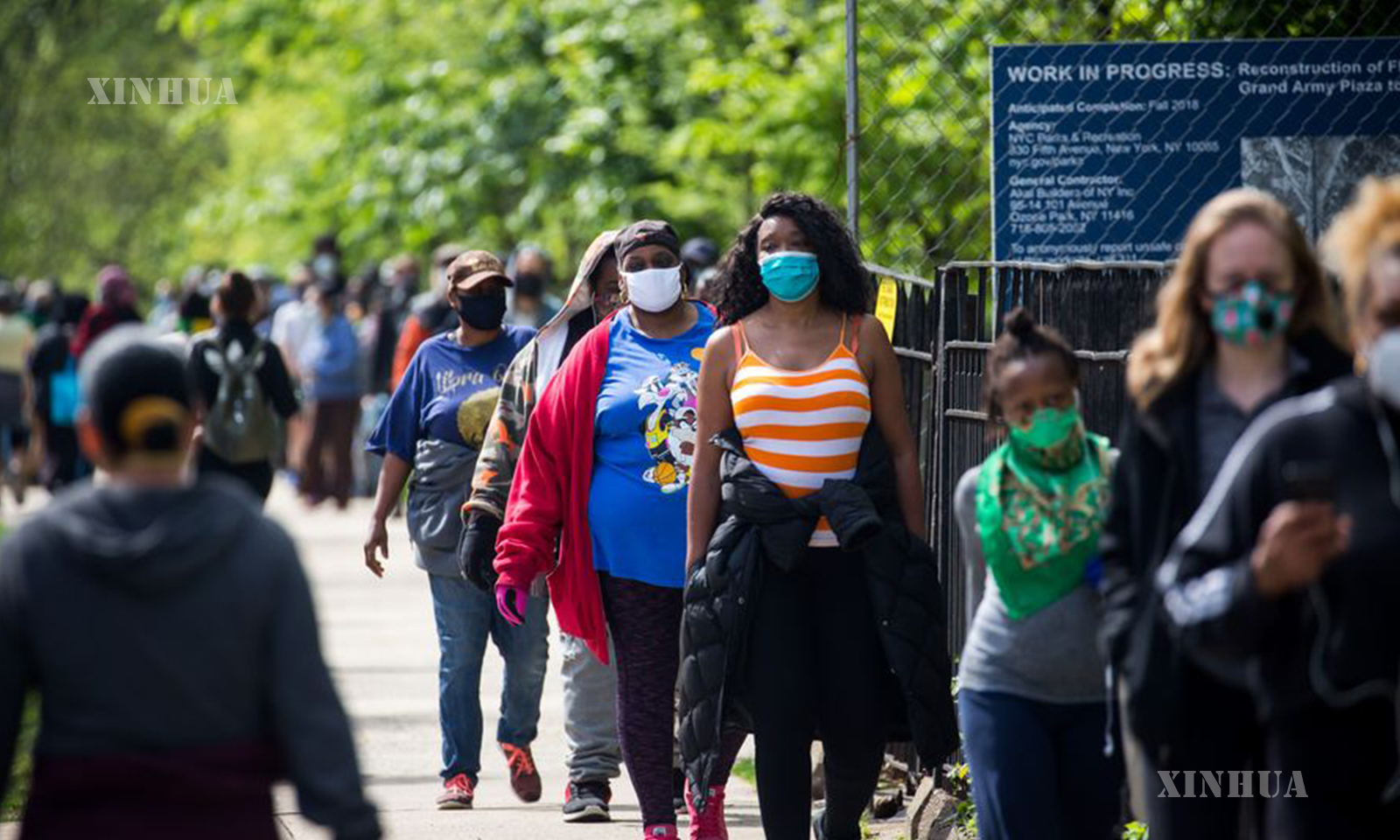WORLD
အမေရိကန်နိုင်ငံ၌ COVID-19 ကာကွယ်ဆေးထိုးနှံပြီးနောက် နှလုံးပြဿနာဖြစ်ပွားသူ ၁,၂၀၀ ကျော်ရှိကြောင်းထုတ်ပြန်

ဝါရှင်တန်၊ ဇွန် ၂၄ ရက် (ဆင်ဟွာ)
အမေရိကန်နိုင်ငံ၌ mRNA COVID-19 ကိုဗစ်ကာကွယ်ဆေးထိုးနောက်ပြီးနောက် လူငယ်များတွင် နှလုံးကြွက်သားယောင်ယမ်းခြင်းနှင့် နှလုံးအမြှေးပါးယောင်ခြင်းများဖြစ်ပွားမှုပေါင်း ၁,၂၀၀ ကျော် ထိရှိခဲ့ကြောင်း အမေရိကန်နိုင်ငံ ရောဂါကာကွယ်ရေးနှင့် ထိန်းချုပ်ရေးစင်တာ (CDC) မှ ဇွန် ၂၃ ရက်တွင် ထုတ်ပြန်ချက်အရ သိရသည်။CDC ၏ ကာကွယ်ဆေးထိုးနှံခြင်းဆိုင်ရာအကြံပေးကော်မတီမှ ကျွမ်းကျင်သူများက ငယ်ရွယ်သူများတွင် ကာကွယ်ဆေးထိုးနှံပြီးနောက် နှလုံးပြဿနာများ ဖြစ်ပွားနိုင်ခြေကို ပြန်လည်သုံးသပ်ရန် ဇွန် ၂၃ ရက်တွင် ပြောကြားခဲ့သည်။
ဇွန် ၁၁ ရက်မှ စ၍ Pfizer သို့မဟုတ် Moderna COVID-19 ကာကွယ်ဆေးထိုးနှံထားသော လူငယ်လူရွယ်များတွင် စုစုပေါင်း ၁,၂၂၆ ဦးတွင် နှလုံးကြွက်သားယောင်ယမ်းခြင်းနှင့် နှလုံးအမြှေးပါးယောင်ခြင်းများ ဖြစ်ပေါ်ခဲ့ကြောင်း CDC ၏ ထုတ်ပြန်ချက်အရ သိရသည်။
mRNA ကာကွယ်ဆေး တစ်ကြိမ်ထိုးနှံပြီးနောက် ရောဂါဖြစ်ပွားသူ ၂၆၇ ဦးနှင့် နှစ်ကြိမ်ထိုးနှံပြီးနောက် ရောဂါဖြစ်ပွားသူ ၈၂၇ ဦးရှိကြောင်း သိရသည်။ နောက်ထပ် ရောဂါဖြစ်ပွားသူ ၁၃၂ ဦးမှာမူ ကာကွယ်ဆေး အရေအတွက် မည်မျှထိုးနှံထားသည်ကို မသိရကြောင်း CDC ထံမှ သိရသည်။
ယင်းဖြစ်ရပ်များတွင် ၃၀၉ ဦး မှာ ယင်းရောဂါလက္ခဏာပြလာခြင်းကြောင့် ဆေးရုံတွင် ကုသမှုခံယူခဲ့ရကြောင်း နှင့် ၂၉၅ ဦးမှာ ဆေးရုံမှ ဆင်းခွင့်ရရှိပြီးဖြစ်ကြောင်း သိရသည်။ ၎င်းတို့အနက် ၇၉ ရာခိုင်နှုန်း မှာအပြည့်အဝ ပြန်လည်ကျန်းမာလာပြီဖြစ်ကြောင်း သိရသည်။ ဇွန် ၁၁ရက်အထိ ၉ ဦးမှာ ဆေးရုံ၌ ကုသမှုခံယူနေရဆဲဖြစ်ပြီး ၂ ဦးမှာ ရောဂါပြင်းထန်ကြောင်း CDC မှ သိရသည်။
ရောဂါဖြစ်ပွားမှုအများစုမှာ ပြင်းထန်မှုမရှိကြောင်းနှင့် တစ်ရက်သို့မဟုတ် တစ် ရက်ကျော်အတွင်း ပင်ပန်းနွမ်းနယ်သောလက္ခဏာများနှင့် ရင်ဘတ်အောင့်ခြင်းနှင့် နှလုံးခုန်မူမမှန်ခြင်းများ ဖြစ်ပေါ်ကြောင်း သိရသည်။
အသက် ၃၀ နှစ်အောက် အမျိုးသားများသည် ရောဂါဖြစ်ပွါးမှု အများဆုံးဖြစ်သည်။ CDC ၏ထုတ်ပြန်ချက်အရ ဒုတိယအကြိမ် ကာကွယ်ဆေးထိုးနှံပြီးသူသည် ပထမအကြိမ် ကာကွယ်ဆေးထိုးနှံထားသူထက် ဖြစ်ပွားမှု ပိုမိုများပြားကြောင်း သိရသည်။
လူနာများအား လာမည့်လများတွင် နောက်ဆက်တွဲ ဖြစ်ပွားမှု အကျိုးဆက်အား နားလည်သဘောပေါက်သည်အထိ နောက်ဆက်တွဲစောင့်ကြပ်ကြည့်ရှုရန် လိုအပ်ကြောင်း ကျွမ်းကျင်သူများကပြောသည်။
ဖြစ်နိုင်ခြေရှိသောအန္တရာယ်များအား ပိုမိုပြည့်စုံသော အချက်အလက်များအား အပြည့်အဝနားလည်ရန် ရေရှည်ဖြစ်နိုင်ခြေရှိမရှိနှင့် ယင်းအားမည်သို့စီမံခန့်ခွဲမည် ကို CDC တာဝန်ရှိသူများအနေဖြင့် အချက်အလက်စုဆောင်းရန် လိုအပ်ကြောင်း လုံခြုံရေးအဖွဲ့ မှ ဥက္ကဋ္ဌ Grace Lee က ပြောသည်။
ယင်းဖြစ်ရပ်မှာ ရှားပါးသည့် ဖြစ်တောင့်ဖြစ်ခဲဖြစ်ရပ်ဖြစ်ပြီး လူ တစ်သန်းတွင် ၁၂.၆ ဦးမှာ နှလုံးယောင်ယမ်းခြင်း ဖြစ်ပွားမှုရှိကြောင်း ကျွမ်းကျင်သူကဆိုသည်။
mRNA ကာကွယ်ဆေးထိုးနှံထားသည့် သန်းချီသည့် ပြည်သူများတွင် COVID-19 ဖြစ်ပွားရန် အလှမ်းပိုမိုဝေးကြောင်းနှင့် ကြွက်သားယောင်ယမ်းမှုဖြစ်ပွားနိုင်ခြေ အရေအတွက် နှင့် ဆေးရုံတက်ရောက်ရခြင်းနှင့် နိုင်းယှုဉ်ပါက အန္တရာယ်ထက် အကျိုးကျေးဇူး ပိုများကြောင်း တာဝန်ရှိသူများက အလေးထား ပြောကြားခဲ့သည်။
အမေရိကန်နိုင်ငံ၌ ဇွန် ၂၃ ရက်အထိ လူဦးရေဦး၏၄၅.၄ ရာခိုင်နှုန်း မှာ COVID-19 ကာကွယ်ဆေး အပြည့်အဝ ထိုးနှံပြီးဖြစ်ကြောင်းနှင့် လူဦးရေ၏ ၅၃.၆ ရာခိုင်နှုန်းမှာ ကာကွယ်ဆေးပထမအကြိမ် ထိုးနှံပြီးဖြစ်ကြောင်း CDC ၏ အချက်အလက်များအရ သိရသည်။အမေရိကန်နိုင်ငံ၌ အကြမ်းအားဖြင့် အသက် ၁၈ နှစ်နှင့်အထက် လူဦးရေ ၁၄၄.၈ သန်းမှာ အပြည့်အဝ ကာကွယ်ဆေးထိုးနှံပြီးဖြစ်ကြောင်း သိရသည်။ (Xinhua)
———————————————
(English Version)
Roundup: U.S. reports over 1,200 heart problem cases after COVID-19 vaccination
WASHINGTON, June 23 (Xinhua) — More than 1,200 cases of myocarditis and pericarditis have been reported across the United States in young people who received mRNA COVID-19 vaccines, according to the U.S. Centers for Disease Control and Prevention (CDC) on Wednesday.
Experts of CDC’s Advisory Committee on Immunization Practices met on Wednesday to review risks of these rare heart problems in the vaccinated younger population.
A total of 1,226 cases of myocarditis and pericarditis have been reported in young people who received Pfizer’s or Moderna’s COVID-19 vaccines through June 11, according to the CDC.
There have been 267 cases reported after receiving one dose of the mRNA vaccines, and 827 reported cases after two doses. There are 132 additional cases where the number of doses received is unknown, according to the CDC.
Of these cases, 309 developed symptoms and were hospitalized, and 295 people have been discharged. About 79 percent of them have fully recovered. Nine people were still hospitalized, with two in intensive care as of June 11, according to the CDC.
Most cases have been mild, with symptoms like fatigue, chest pain and disturbances in heart rhythm that quickly clear up within a day or so.
Males under 30 make up the majority of the cases. More cases occurred after the second dose than the first, according to the CDC.
Experts said they will need to follow up with patients in the months ahead in order to get a complete picture of the impact.
CDC officials are gathering more data to fully understand the potential risks, how to manage it and whether there are any long-term issues, said Grace Lee, who chairs the committee’s safety group. Experts stressed this occurrence is rare, about 12.6 heart inflammation cases per million doses.
Officials emphasized that the benefits of COVID-19 vaccines outweigh the risks, and noted that for every million doses of mRNA vaccine given, there are far more COVID-19 cases and hospitalizations prevented compared to the number of potential myocarditis cases. About 45.4 percent of the U.S. population is fully vaccinated against COVID-19, and 53.6 percent of the population has received at least one shot as of Wednesday, according to CDC data.
Roughly 144.8 million of people 18 and older in the United States are fully vaccinated. Enditem






